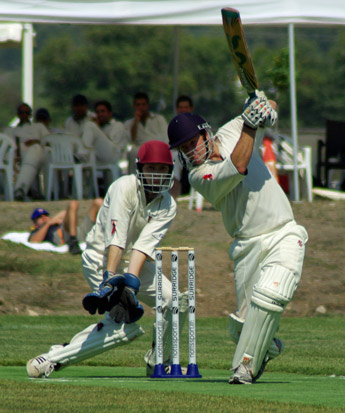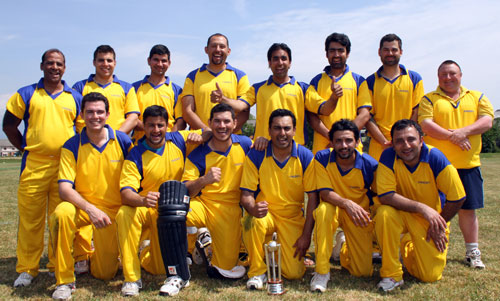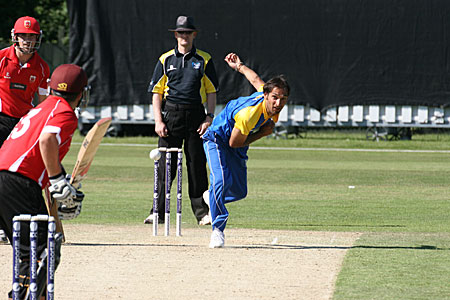The Scandanavian country recently grabbed the headlines with their amazing coup of appointing former South African Test player Jonty Rhodes as their Head Coach – a real statement of intent.
They have been an affiliate member since 1997, gaining Associate status in 2017, and were given a further boost by the ICC decision the following year to grant all countries T20I status.
Roy Morgan traces the history of the game in the country back to 1883 when Erik Blidbert, who had learned his cricket in London formed the Lyckans Samfund Cricket Club in Gothenburg, but the club only lasted a few years. Another attempt to introduce cricket in the 1920s at the international boarding school in Varmland went the same way.
The first real positive and enduring effort came in 1948 with the formation of Stockholm CC by British Embassy staff, who, given the transient nature of their numbers, opened up membership to all-comers.
The Swedish Cricket Federation aka Svenska Cricketförbundet was formed in late 1989 with a view to promote the game and they made their international debut at the ECF Nations Cup in 1993, and went on to play in European tournaments in 1995, 1996, 1999 and 2001 with little success.
 Chris Tebbut during his century against the Czech Republic in Corfu
Chris Tebbut during his century against the Czech Republic in Corfu
A damaging rift in 2000 between the board and certain clubs over the aims of getting more indigenous Swedes playing the game, rather than a reliance on immigrants saw some clubs boycotting the league and in 2003 Malmo and Malmohus opted to play in the Danish League.
An eight-year hiatus ensued in international competition with their participation in the Nordic Cup against Norway, Finland and Denmark, which served as preparation for the European Division 5 tournament in Corfu.
They finished second to Greece, but won four of their five games with a number of noteworthy performances. Azim Khalil topped the wickets aggregate with 16, Chris Tebbutt (108) scored their first international century as they made their highest score 348 for 9 against the Czech Republic, while Imran Zaigham recorded their best bowling analysis of 6 for 17 as Turkey were bowled out for 41.
Their finest hour came in the 2011 European Division Three tournament held in Slovenia and Austria as they swept all before them in a dominant fashion beating Estonia, Slovenia, the Czech Republic, Turkey and Bulgaria to capture their first silverware under the astute leadership of Celtic Coach Colin Siller who had honed his skills in both his native Scotland and Ireland.
 ICC European Division 3 Champions 2011 in Slovenia (© CricketEurope)
ICC European Division 3 Champions 2011 in Slovenia (© CricketEurope)
Their Division Two campaign later that year in Belgium didn't go well as they finished 11th out of 11 teams, with their sole win being against Malta in the group stages, although the Maltesers would later beat them by three runs in the play-offs.
One remarkable incident from the tournament saw an opposing player suffering a facial injury while fielding. He was in good hands though as the two Swedish batsmen at the time were a surgeon and a doctor, while one of the on-field umpires was a paramedic!
They were back in Corfu in 2012 and gained promotion to the top flight after topping their group, going on to reach the final by beating Spain by one wicket in a dramatic last ball finish. They lost the final to Isle of Man but second place ensured promotion.
 Jalali Wakil bowling against Gibraltar at the 2013 European Championships (© CricketEurope)
Jalali Wakil bowling against Gibraltar at the 2013 European Championships (© CricketEurope)
They found Division One held in Sussex a tough proposition and were relegated after finishing 11th, winning one match against Austria. Sadat Sidiqi was seventh in the batting aggregates (202), while Muhammad Naveed recorded a five wicket haul, taking 5-33 against Norway.
They hosted a tournament for the first time in 2016, and with the benefit of home conditions gained promotion as they finished second to Germany, one of the emerging powerhouses in European cricket. They followed that up with another second place finish in 2017, again to Germany in The Netherlands, who also hosted one of the largest ever competitions in 2018, with Sweden one of 18 participants.
Despite wins over the Czech Republic, Israel and Gibraltar, Sweden missed out on the next phase of qualification by losing to Guernsey and Norway who progressed.
With the surge in immigration the number of clubs in Sweden has been bolstered to over 70 and is growing all the time. If these numbers can be harnessed in the right way and the mistakes of the past not repeated, then Sweden with Rhodes at the helm could be on the verge of something special in the years ahead.
This history of the game in Sweden was first written by Roy Morgan in 2006 and has been updated by CricketEurope.

